HIT CHANNEL EXCLUSIVE INTERVIEW: September 2018. We had the great honour to talk with an extremely talented musician: Edgar Winter. He sings as well as plays keyboards, saxophone and percussion. He has a very successful career as a solo artist, with Edgar Winter’s White Trash and The Edgar Winter Group. His instrumental song “Frankenstein” went to No.1 at Billboard Hot 100 in 1973. He has also played with his legendary brother, Johnny Winter and Ringo Starr & His All-Starr Band. His latest studio album is “Rebel Road”, released in 2008. Read below the very interesting things Edgar told us:
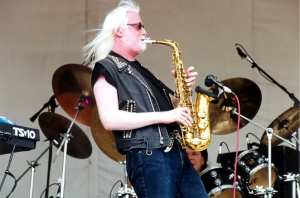 You have done a lot of concerts this year so far. Are you satisfied with the response you get from fans on the road?
You have done a lot of concerts this year so far. Are you satisfied with the response you get from fans on the road?
Yes, we play pretty much all of the time. We play mostly in weekends. We probably do 50-100 shows a year. I do it because I love playing. I always play, since I was a child. I started to play when I was 4 years old and my brother and I, played ukulele together and sang Everly Brothers songs. When Johnny graduated to guitar, I decided I would play everything else! So, I played bass for a while, drums and then keyboards. Then, I picked up saxophone. It became my first love. I really love playing the saxophone, it’s my favourite instrument. I still enjoy playing every day, as much as I did when I first started out. So, you’ll never hear Edgar Winter talking about a farewell tour. I intend to play until the day I die. It’s so great the interest in the music from the ‘70s. Who would have predicted that there would be a classic rock genre and that interest would go on until the present day? It’s a wonderful experience for me and I’m very thankful to all the fans. I think they’ll come out and see our shows and have a great time!
Are you currently involved with other projects?
Yes, I am. I am starting to work on a tribute album for my brother, Johnny Winter. He is my all-time musical hero. He and I, started out playing together and if it wasn’t for him, I doubt that I would have ever gone on to do what I have done. I might have been a jazz musician or I might have been an engineer. I would have been in music somehow, but I doubt that it would have happened in the same way. Part of the reason that I want to do this tribute album for Johnny, is out of love and respect for him for everything that he had given me and how much he had given the world. I think it is gonna be a beautiful experience and it’s something that I feel that I mean to do. So, I am very much looking forward to doing that and that is my plan. I’ll call some of my guitar player friends: Joe Walsh of course, of The James Gang and The Eagles, Billy Gibbons with the ZZ Top, some of the best players. Kenny Wayne Shepherd and Joe Bonamassa. They all want to do so. They all said they would love to be a part of this. Slash played on my last record, the “Rebel Road” (2008) record. So, I intend to ask him. And Ringo Starr, of course, The Beatles drummer. I have played with Ringo in His All-Starr Band and he said he would love to do a song. We have a good start from there.
Are you looking forward to doing the Rock Legends Cruise VII in February 2019?
I love doing that cruise. I’ve done it several times, it’s always a lot of fun and it reminds me of the festivals like Woodstock, where you ‘ve got to see a lot of dear friends who have been in the business from the old times. There is always an opportunity to jam with different people. It’s gonna be a lot of fun. There will be a lot of great newbies and I’ll get to see new acquaintances with a lot of old friends.
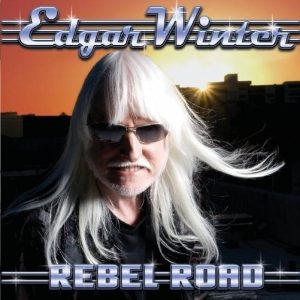 It’s been 10 years since your latest studio album, “Rebel Road”. What are your feelings today about this album? I love “Texas Tornado”!
It’s been 10 years since your latest studio album, “Rebel Road”. What are your feelings today about this album? I love “Texas Tornado”!
I tried to make an album the same way that we used to record in the past. The time that we grew up in, to come out and play music was something so special, but I really do believe that there are two golden eras in music: The ‘40s and ‘50s for Big Band jazz and swing and the ‘60s and ‘70s for rock. I think they were really unparalleled. I think the reason that music was so great then, was because there was such complete freedom. There was no intervention from record companies. There was no-one looking over your shoulder. Bands would go into the studio with 3 or 4 songs and actually created music in the studio. I think the magic of that era was the immediacy of that concept, rather than having to submit demos and have approval from the companies for the songs.
So, we tried to make that album “Rebel Road” the way we did in that era. I had met Slash at the White House when we did the new millennium show. When it turned 2000, they put on an all star band and there were a lot of people who played in: Quincy Jones with a hundred voice choir… It was a huge event and I got to know Slash at that time and I thought he is the perfect person to play on the title track, “Rebel Road”. It’s a pretty wild and crazy song and he did it. He was the perfect musical complement for that. I also invited Clint Black, who is a great country artist and a fellow Texan, from Texas, my home state. Not only he’s a great writer and a country artist, but also he plays great harmonica. I had a song called “The Power of Positive Drinking” and I really wanted the country-style part on that song. So, he was kind enough to agree and play on it. We had a great time making that record and on every show that I do, I would do 2 or 3 songs from “Rebel Road”.
Did you expect the huge commercial success of your song “Frankenstein” (1972)?
No (laughs). We almost didn’t put the song. We had no intention of recording “Frankenstein”. It was a song that I wrote years earlier, when I was playing with my brother Johnny and I came up with the riff (ed: he sings the “Frankenstein” riff) and it was a bluesy kind of riff that we got to play. I played Hammond organ and alto sax and then we did the dual drum solo, we had two drum sets on stage. I did the dual drum solo with Johnny’s drummer, “Red” Turner. We called it “The Double Drum Song”, because of the double drum solo. Years later, when the synthesizer came out, I happened to be the first person to get the idea of putting a strap on the keyboard. I had been really frustrated being stuck behind a big set of keyboards. It was a simple and obvious idea that you ‘d think that someone would have started that out. Most keyboards, prior to synthesizers, were too heavy to do that. I decided to walk in a music store and I went to see the synthesizer and I said: “Wow!! I should put a strap on that and play it like a guitar”.
 So, at the point I was looking for a song to feature the synthesizer and I thought: “Wow. I bet that old “Double Drum Song” would sound really good with that subsonic synth bottom”. We worked up a version of this and started to play it live and it was killer! We got an amazing response. No-one had ever seen someone with a keyboard around their neck. That was one thing and the song itself got an amazing response. But we still didn’t think of recording it, because it was so long. Our live song was almost 20 minutes long. We started to record, but in the tape of recording, we just accidentally happened to have two or three versions of it. It was such a fun song to play. A live song that we all wanted to play. We were in love with that song. Back in those days the only way to edit something, was to physically cut the master tape. It was like cutting a diamond, if you messed it up, then it’s gone. Rick (ed: Derringer –guitar, producer) and I had been into the project and he said that we could edit that into something that would be shorter to include on the album. I thought it was a crazy idea, but I love crazy ideas.
So, at the point I was looking for a song to feature the synthesizer and I thought: “Wow. I bet that old “Double Drum Song” would sound really good with that subsonic synth bottom”. We worked up a version of this and started to play it live and it was killer! We got an amazing response. No-one had ever seen someone with a keyboard around their neck. That was one thing and the song itself got an amazing response. But we still didn’t think of recording it, because it was so long. Our live song was almost 20 minutes long. We started to record, but in the tape of recording, we just accidentally happened to have two or three versions of it. It was such a fun song to play. A live song that we all wanted to play. We were in love with that song. Back in those days the only way to edit something, was to physically cut the master tape. It was like cutting a diamond, if you messed it up, then it’s gone. Rick (ed: Derringer –guitar, producer) and I had been into the project and he said that we could edit that into something that would be shorter to include on the album. I thought it was a crazy idea, but I love crazy ideas.
In the end of the project, we were in the studio and it was all in pieces, lying over of back of chairs, on the consoles and we were trying to figure out which part to use and how we were going to put it back together. The drummer, Chuck Ruff, then mumbled the immortal words: “Wow man, it’s like Frankenstein”. He was drawing the analogy of an arm here and a leg there and putting the thing back together. He said: “How, it’s like Frankenstein”, but it kind of sounds like Frankenstein. We just liked the perfect name. Even after we put it on the album, “Free Ride” was the song that we believed in and we thought that would be a hit. We released it as the first single and it didn’t do anything. So, we continued to release songs from that album (ed: “They Only Come Out at Night” -1972) and it was about three or four singles later when we put it on the B-side.
I think “Hangin’ Around” was released on the A-side. It started getting airplay on the FM Underground College radio stations. So, it was just a purely accidental thing that nobody expected. I think it’s a good example whenever people ask me: “Do you have any advice for young people starting out?” I always tell them: “Play the music that you most love, the music that you truly like and don’t worry about trying to sell records and trying to imagine what people want to hear. Just play the music that is in your heart”. I think that fact that “Frankenstein” was totally accidental happened because it came out of a song that we played truly out of love for the song and we enjoyed playing it. That’s the story of “Frankenstein”.
I believe that the live version of “Tobacco Road” from the “Roadwork” (1972) album is one of the best covers of all time! Are you proud of this cover?
Yes. Once again, I’m very proud of that song and I still do it in every set and that was another thing that happened, more or less, by accident. I didn’t really consider myself a singer. I was more interested in jazz and classical music and I was playing with my brother Johnny and one night he said: “Hey Edgar, why don’t you sing a song?” I have always liked “Tobacco Road” because of the positive message, in other words, a person born in difficult circumstances having to overcome obstacles. There is a lot of suffering in blues songs: “My baby left me” and “I lost my job and lost my home”. I like the fact that “Tobacco Road” has a happy ending. Somebody once asked me about what my definition of the blues is. The best thing I came up with is: “The blues is transforming suffering into joy”. There is something really happy about. Even though, there is a lot of suffering and trouble in blues, in the lyrics, it’s somehow uplifting and you feel: “Oh, things can always be blue, but there is something very joyous about the meaning” and especially I feel that thing in “Tobacco Road”.
 Do you remember your amazing performance at the Concert 10 Festival at Pocono International Raceway in 1972 with Emerson, Lake & Palmer, Faces and Humble Pie?
Do you remember your amazing performance at the Concert 10 Festival at Pocono International Raceway in 1972 with Emerson, Lake & Palmer, Faces and Humble Pie?
I remember that particular concert. What I love about all of the festivals of that era, was that there was so much variety in the music and you could have everybody from Jimi Hendrix, Country Joe and the Fish, Vanilla Fudge and Janis Joplin. Woodstock was the main festival that really changed my life because up to that point, I had thought of myself more as a serious musician. Thankfully, I ‘ve gotten over that. When I am playing in front of an audience, music takes me out of myself. It lifts me to a place beyond. It makes me feel I’m part of something greater than myself. It’s a very spiritual feeling. In that moment, whatever cares or worries or problems that you may have, they stay in the background and emerge just in the moment of playing. I think that is what happened with the audience. In that moment, you are united and you are one. It’s a wonderful and indescribable feeling and one that I get every time that I play for any audience, in particular when I play at large festivals. It means the world and it means what I love most and see everybody out enjoying themselves, rocking and have a great time!
What memories do you have of Woodstock, in particular? You played there with the Johnny Winter band.
As I said, it really changed my life because the whole thing was set against the social backdrop of Civil Rights and the peace movement. There were people who were writing and singing songs that they truly believed in. A moment I will never forget: Being on stage and looking out over this endless sea of humanity and seeing all those people united and brought together in that unique way. It went beyond you. I grew up playing music in my own, personal, private escape world. I never really had any desire to become famous. I just loved music in and of itself. I love the beauty of harmony and rhythm. When I played Woodstock and saw all of those people, it changed my whole thinking about music and made me realize that music was not just my own personal world, but it has the power to reach out, to transcend boundaries and bring people together. That’s when I decided that I wanted to be an artist and I was going to start writing music and actually start singing. I thought I had to find a way of making this meaningful, to give something back to the world for what is and is gonna be. That was my feeling. Also, I got to experience Woodstock because nobody knew that Johnny had a brother. I went out in the audience, just to put myself in fans’ stance and try to learn. I got to see it from the audience side and also the performer side. I remember there was also an infirmary there for a lot of people who had taken a lot of drugs and had trouble with tripping. I remember talking to a lot of those people, trying to encourage them and give them some comfort and support. It was such a memorable experience. For all those reasons it was something that I will never forget and I will always think of that as the beginning of my career, Woodstock.
Was it an interesting experience to watch your brother Johnny and Jimi Hendrix jamming together?
I saw them jam together at a night club in New York, called The Scene. Johnny and most of us, loved Jimi Hendrix’s playing and we knew that he is an amazing player. I never really got to talk to Jimi that much, but Johnny did. Johnny really knew him better. There were so many great performers in that time. Certainly, I think Jimi Hendrix really changed the whole approach to guitar. Jeff Beck was another pioneer. There are very few people on that level and certainly Jimi made an amazing fun of issue. I think he inspired Johnny and I can hear a lot of that in Johnny’s playing. All great guitarists, everybody, had an amazing influence on what Johnny did. All they know it.
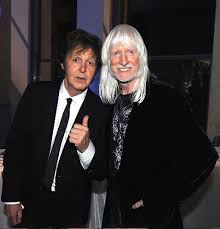 What was it like to be a member of Ringo Starr’s band for four years?
What was it like to be a member of Ringo Starr’s band for four years?
It was an honour and a pleasure. Ringo is just an amazing person, certainly as a musician, but also he is such a heartfelt advocate and spokesman for peace and love, something that is so needed in the world. Having played at Woodstock and being an old hippie, that message is very dear to my heart. I feel like The Beatles were bigger than music. They changed the mindset of an entire generation and they brought about a revolution without firing a shot. It was all about freedom: freedom of thought, freedom of being and freedom of music. They transcended music. They were probably the most amazing group of musicians and their songs were great. My biggest memory of that time, was on Ringo’s 70th birthday. We were playing at Radio City Music Hall and there was a surprise that Ringo didn’t know. In the end of the concert, Paul McCartney came out on stage and Joe Walsh was there, setting Paul’s bass and we were playing “Tatatatata/ta-tata/ This is your birthday” (ed: The Beatles’ “Birthday” song). I just couldn’t believe it. I just walked and I was on stage with two of The Beatles and Joe Walsh. It was just an amazing experience and a memory that I will never forget. I talked to Ringo recently and he is going to play on the Johnny tribute album. As a matter of fact, he said: “I want to play drums on a track”. So, I look forward to that and he is a great man.
What is the secret of your lasting friendship and collaboration with Rick Derringer (guitar)? You even played in Ringo’s band together!
Yes, we played in Ringo’s band and we normally do 10 or 20 shows a year together. I ‘m sure he will be on the Johnny tribute album, as well. He has been a friend and I think he’s a great artist. He produced all of my early records. He played in White Trash and The Edgar Winter Group. Ronnie Montrose was the original guitarist in the Edgar Winter Group and Rick came back on track. In the end, Rick played in both of those bands, he was on the “Roadwork” album. I think he’s an amazing guitarist, a great writer and it is always an honour to play with him and share the stage and I’m sure we will continue doing music together for as long as we both live.
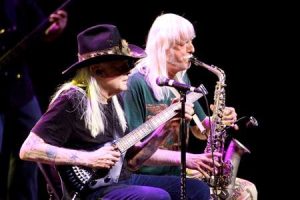 Walter Trout says that you do ballads, you do hard rock, you do jazzy stuff, you do R&B, you do all sorts of stuff.
Walter Trout says that you do ballads, you do hard rock, you do jazzy stuff, you do R&B, you do all sorts of stuff.
I love all kinds of music and I never understood why people had to separate music into categories. I think record companies have a lot to do with this. A lot of times, they want you to play one specific style of music because they are trying to target an audience. It’s more for marketing. I love jazz, classical, country, blues and rock. I intend to continue to play all kinds of music and I think that is part of why I still have such a deep love of music, being able to reach a style, back and forth, that keeps it new, fresh and interesting. Also, playing a number of instruments, it’s the same thing. If you ever feel that you are tired or you are in a rut, all you have to do is pick up a different instrument and you are back and very well. It reminds me of when I first started to play.
When we grew up in Texas, there were really cowboys playing country music, there were real authentic black guys playing blues. It was on the Louisiana border, so there was all the New Orleans music: Dr. John and Allen Toussaint and this French Cajun zydeco music. It was close to Mexico where there were hot Latin rhythm players as well and there is a great music school, North Texas, which is particularly for jazz. So, there were really intellectual jazz players, as well. So, it was a great area with a great musical heritage where music would pass on from father to son. Everyone in my family was musical: My dad played guitar, banjo and played alto sax in a swing band in his youth. He had a barbershop quartet and sang in a choir. My mother played beautiful classical piano, not professionally, but she played very well. So, music was always a part of our family and I’m glad to be able to carry on and play the music that I love and I will continue to play all styles of music.
Can you please tell us a few words about another major musical influence of yours: Ray Charles?
Oh, Ray? Yes, absolutely! If you asked me one person that is my most profound musical influence, it would be Ray Charles. He played and sang a wide variety of styles. He could play jazz, he was a great gospel player. I think gospel is probably the least understood and most overlooked kind of music. Playing his blues, he got the recognition he so much deserved, but gospel, is really the flipside of that coin. Ray also did country. He was totally overstrained and played all styles, but the main thing was the sincerity, the honesty. His style of singing was just all heartfelt and so passionate. He is the person that actually made me to walk and sing, as well as play. In his piano style, he had a little of all those styles: jazz, country, gospel and R&B. Pretty much, he did it all and did it in such a unique way. I think even people who don’t feel the emotion that he put into his singing, regardless if there was anybody who would try to copy his style, his whole appearance had such an impact, that really had a deep effect on pop and rock and everything that is blues-oriented, that singers all over the world could tell how such a big influence was Ray.
Had you ever met Stevie Ray Vaughan?
I think Steve Ray was an amazing guitarist and he listened to all the great blues players. He had his own unique style, it was more heavy. So, there was a lot of that influence as well, but he was absolutely one of my favourite guitarists.
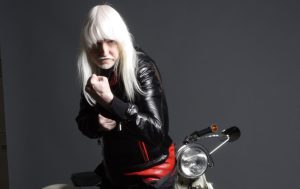 He had musicians from the Johnny Winter band, like Tommy Shannon (bass –played at Woodstock with Johnny).
He had musicians from the Johnny Winter band, like Tommy Shannon (bass –played at Woodstock with Johnny).
Yes. I love the fact that Tommy went on to play with Stevie Ray. I met Stevie, we just knew his brother, nobody knew who he was. I met him at a party once and he introduced himself and Tommy told me how much he loved to play. I never had heard of him before, at the time, but I always remember having met him then and thinking what a nice guy and how enthusiastic about anything he was. Certainly, he went on and did great things.
Thank you very much for the interview.
You are very welcome. It was a pleasure talking to you and I hope that sometime I’ll get to come to Greece. I love Greece because of your art and culture, the idea of the city-state and the democratic government. You have given so much to the world. I hope I’ll get to go there and meet some people and see you all.
A huge “THANK YOU” to Mr. Edgar Winter for his time and to Mrs. Michelle Roche for her valuable help.
Official Edgar Winter website: http://edgarwinter.com/
Official Edgar Winter Facebook page: https://www.facebook.com/officialedgarwinter

